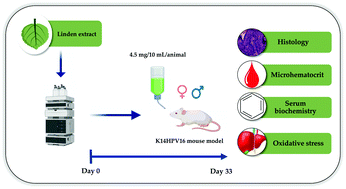Toxicological and anti-tumor effects of a linden extract (Tilia platyphyllos Scop.) in a HPV16-transgenic mouse model
Abstract
Tilia platyphyllos Scop. is a popular broad-leaved tree, native to Central and Southern Europe. Hydroethanolic extracts rich in phenolic compounds obtained from T. platyphyllos Scop. have shown in vitro antioxidant, anti-inflammatory and antitumor properties. The aim of this work was to evaluate the therapeutic properties of a hydroethanolic extract obtained from T. platyphyllos in HPV16-transgenic mice. The animals were divided into eight groups according to their sex and phenotype. Four groups of female: HPV+ exposed to linden (HPV linden; n = 6), HPV+ (HPV water; n = 4), HPV− exposed to linden (WT linden; n = 5) and HPV− (WT water; n = 4) and four groups of male: HPV+ exposed to linden (HPV linden; n = 5), HPV+ (HPV water; n = 5), HPV− exposed to linden (WT linden; n = 5) and HPV− (WT water; n = 7). The linden (Tilia platyphyllos Scop.) extract was orally administered at a dose of 4.5 mg/10 mL per animal (dissolved in water) and changed daily for 33 days. The hydroethanolic extract of T. platyphyllos consisted of protocatechuic acid and (−)-epicatechin as the most abundant phenolic acid and flavonoid, respectively, and was found to be stable during the studied period. In two male groups a significant positive weight gain was observed but without association with the linden extract. Histological, biochemical, and oxidative stress analyses for the evaluation of kidney and liver damage support the hypothesis that the linden extract is safe and well-tolerated under the present experimental conditions. Skin histopathology does not demonstrate the chemopreventive effect of the linden extract against HPV16-induced lesions. The linden extract has revealed a favourable toxicological profile; however, additional studies are required to determine the chemopreventive potential of the linden extract.



 Please wait while we load your content...
Please wait while we load your content...